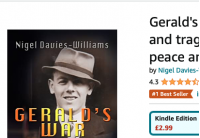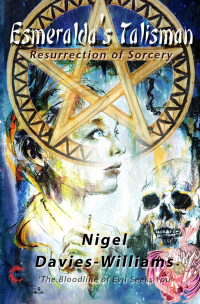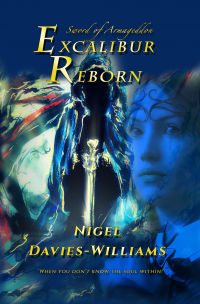Genre:
Crime Fiction Historical Fiction Literary Fiction Fantasy Teen & Young Adult- Country: United Kingdom
- Books: 3
- Profession: Author
- Born: 6 October
- Member Since: May 2021
- Profile Views: 10,800
- Followers: 89
Gerald's War
(Foreword by Sir David Jason)
‘Based on the true and tragic tale of one man's life in peace and in war.’
Gerald Davies, the eponymous hero of the novel has a hard upbringing, his mother is forced into an asylum by his father who has taken up with a woman half his age. Unknown to Gerald, the person he knows as his aunt is actually his real mother.
To escape, Gerald joins the RAF. He trains to be a pilot observer.
Gerald is attached to 211 Blenheim Bomber Squadron and is sent to the Western Desert campaign. He is injured and taken to hospital in Alexandria where he meets Pilot Officer Roald Dahl, who has been injured in a crash flying his Gloster Gladiator. He also has an encounter with other famous people who played their own part in the conflict, including Syd Lawrence (he of orchestra fame) who, coincidentally, lived and was brought up, just a few streets away from Gerald’s home in Shotton.
During the Greco-Italian War he famously goes missing for several days, being shot down over Corfu. His family think he is dead. Meanwhile, Gerald and crew are being wined and dined by the people of Corfu and meet the famous Spiro Amerikanos, who famously befriended the Durrells (as written about in ‘My Family and Other Animals’ – by Gerald Durrell) on the island when they lived there pre-war. You couldn’t make it up if you wanted to!
From this episode, Gerald gained fame in his own right in 1940, with nationwide press coverage, when he proposed to his girlfriend via the press - this tragic relationship also forms part of the story. Gerald always carried a photograph of ‘Susan’ and when he crashed on Corfu in 1940, he blamed the fact he’d lost the photograph of Susan as the cause of his bad luck.
Things get worse when Germany declares war on Greece on 6th April 1941.
On Easter Sunday, 13th April tragedy strikes when all six Blenheims sent to tackle the German advance pouring into Greece are shot down. Gerald is tragically killed.
This is a true story based on the life and exploits of my uncle. This is a true story based on the life and exploits of the uncle of the author. The book contains contemporary plus images from my trip to Corfu in 2020 where I was presented with the compass from my uncle's crippled aeroplane.
Excalibur Reborn...
This book is my first venture into fantasy/general fiction and I loved every minute of the writing journey.
The book mixes my love of writing with my love of my home country Wales and the Dark Ages history, about which little is known, especially the historic King Arthur or 'Cadwaladr,’ as he is known in these parts. The ancient unwritten history and legends of forgotten Celtic lands is the backbone of my book Excalibur Reborn, but I coupled this with my interest in the ‘Elysian Concept of Consciousness’ which, I believe, affects all our lives. This is an exploration of our inner soul and the consciousness which may already exist within us at birth, showing we have existed somewhere before. As Wordsworth put in… “…the Soul that rises with us hath had elsewhere its setting and cometh from afar… trailing clouds of glory…”
Sounds crazy I know, but I explore this theory in detail. I mean, what if the reality of our inner souls meant we’d been someone else and we could be that someone else again? The theory means we may all be time travellers within our deepest consciousness and hence hostages of our souls and past lives. Excalibur Reborn leads us to these adventures, in worlds far removed from our own many eons ago.
You will see from the book I love animals and I currently live with two Bernese Mountain Dogs... a Bernese called Truffle features throughout the story – I just couldn’t help putting one in. They are so adorable.
Esmeralda's Talisman
‘An Epic Fantasy Adventure of Souls, Lost Souls, Bloodlines and Mythical Creatures.’
Esmeralda is the progeny of a very special bloodline; a bloodline of Witches, Wizards and Wu-Shi. Even her birth is steeped in mystery, when her mother finds out the mysterious Chinese doctor and French midwife present at her birth don’t even exist. Months later a mysterious package arrives from China containing the ‘Dragon Talisman’ with a note explaining how unique a person Esmeralda is going to be.
Living on an isolated farm in Nouvelle Aquitaine, France, Esmeralda is eleven when she is given the contents of the package, which until then her mother has hidden from her. Her life alters unimaginably, and she is thrown, full on, into a life as a Chinese witch – a Wu-Shi.
Trouble looms when the evil and malicious White Bones Queen seeks Esmeralda out, to complete the Sorcerers Supernatural Trinity; something which will make her immortal.
Esmeralda establishes she is from a long line of evil herself. Can she take on the fight within and conquer her demons and her enemies at the same time.
The book whisks you off to China, then back to the heart of France and into the Catacombs of Paris, eventually leading on a trail to the holiest of shrines in North Wales.
Treachery and traitorous events are ready to take you at every turn.
Esmeralda's Talisman is the long-awaited prequel to Excalibur Reborn.
Nigel Davies-Williams's Books
Stay in the loop on books by Nigel Davies-Williams. See upcoming and best-selling books by the author here. You'll also find the deals on books by Nigel Davies-Williams.
** Please note that the information or price displayed here may not be the updated. Make sure to double-check the latest book price before buying books.
** Also, there might be other books by Nigel Davies-Williams not listed on AllAuthor.
| Book |
|---|
Esmeralda’s Talisman: Resurrection of Sorcery (Souls of Excalibur Book 1)by Nigel Davies-WilliamsPublish: Jul 02, 2024Action & Adventure Fantasy Teen & Young Adult |
Gerald's War: Based on the true and tragic tale of one man's life in peace and warby Nigel Davies-WilliamsPublish: Dec 11, 2021Historical Fiction |
Nigel Davies-Williams's Awards and Achievements
-


Amazon Best Seller
2023Gerald's War: Based on the true and tragic tale of one man's life in peace and war
achievement
Nigel Davies-Williams has earned excellence awards over time. Here is the glimpse of the accolades clinched by the author.
Nigel Davies-Williams Interview On 13, Nov 2024
 "Nigel has always had a deep passion for writing, which, combined with his fascination for genealogical research, Welsh folklore, and the rich history of Wales, has inspired his first two books, Gerald's War and Excalibur Reborn. With a unique blend of storytelling and historical exploration, Nigel brings to life the legendary tales of his homeland, weaving a tapestry of myth and reality that captivates readers."
"Nigel has always had a deep passion for writing, which, combined with his fascination for genealogical research, Welsh folklore, and the rich history of Wales, has inspired his first two books, Gerald's War and Excalibur Reborn. With a unique blend of storytelling and historical exploration, Nigel brings to life the legendary tales of his homeland, weaving a tapestry of myth and reality that captivates readers."
Several things inspired me, firstly, as a youngster, there was always a pastel shaded photograph on the wall in my grandparents’ house of ‘Uncle Gerald’ and, over and over again sadly they recounted the tale of how he had gone missing over Greece in 1941. They told me they knew nothing more and they even liked to believe he may still be alive and living it up in Greece. My mother, Gerald’s sister, had kept an old newspaper story about a proposal of marriage he had made to a girl called Susan Hall in Britain after he had gone missing the first time in Corfu.
Then another weird occurrence happened way back in the 1980s, when I was reading Roald Dahl’s book ‘Going Solo,’ which talked about his experiences as a pilot in the Battle of Athens in 1941. Of course, I knew Pilot Officer Gerald Davies of Shotton in Flintshire had ‘gone missing’ in the same place AND at the same time. So all of these things sowed the seeds that I had to investigate what had happened to Gerald. My grandparents and my mother had always talked about him, but of course by the 1980s my grandparents had both passed away and my mother knew very little else.
With the advent of the internet, it became easier to research matters and for years I’d been making notes about my research but many times the research had hit a brick wall. Then my luck changed in the late when many years later I received a telephone call from a Corfiot called Kostas Kavaddias who told me he knew more, so that’s how I ended up going to Corfu for the first time in 2020
How did you go about researching the historical details of Gerald’s time in the RAF and his encounters with famous figures like Roald Dahl and Syd Lawrence?Well, that’s an interesting question. As regards Roald Dahl I knew he had been in the Battle of Athens just days after my in the same week my uncle had been killed – Easter Sunday, 13th April 1941.
Amazingly while studying Gerald’s RAF Service Record, I saw that he’d been in the same Egyptian hospital at the exact same time as Roald Dahl wrote he had been there following a near fatal crash in a Gloster Gladiator biplane. So, the two were together for a number of days and doubtless would have spoken together. I had no idea what the conversations might have been about, but from reading both of their war records it was easy deduce what the pair might have talked about.
You know, it’s amazing to think that had Roald Dahl perished at that time and my uncle had survived, then generations of children would not have experienced the wonder of Roald Dahl stories they have today. For several years I taught in school and for assemblies around Remembrance Day I would tell the children a Roald Dahl story which sent them into hoots of laughter, then I would tell them about Dahl’s near-death experiences in the war and about my uncle being killed, saying had Dahl been killed and not my uncle then they wouldn’t have such great stories to listen to.
Finding out about Syd Lawrence was also a revelation too. This occurred when I was studying a piece from the National Archives about a crashed German bomber in Gerald’s home town of Shotton. In the article it mentioned that Syd Lawrence had watched the bomber being attacked by spitfires from the local airbase along the River Dee. Lo and behold I then discovered that Lawrence had gone off to Egypt to entertain the troops and unbelievably he been playing in the ‘Canal Club’ on the banks of the Suez Canal where my uncle and his squadron relaxed away from their arduous war duties.
Besides the National Archives and British Library in London, I also studied old newspapers and used Genealogy sites such as Ancestry and Find My Past who’s resources are now vast and so useful.
Can you share any particular challenges you faced while writing about the personal and tragic aspects of Gerald’s life, such as his relationship with Susan?The challenges I faced at times were enormous.
I had the fact that my own mother thought that keeping family secrets was a good thing to do, her thought process being that having children ‘out of wedlock’ was proper immoral, so she wasn’t forthcoming about Gerald for a long time. Of course, I had modern genealogy sites to peruse and these gave me a great lead in to ask more questions of mum. That’s when she came clean and told me more about his tragic upbringing – well what she knew of it anyway.
Then there was the Covid pandemic which affected my first visit to Corfu. A visit which almost didn’t place take place.
Finding out about Susan Hall the girl in the newspaper cutting (the girl he said he was going to marry after you went missing in Corfu ) was even more difficult. I believed she might have been local and asked many people in the area who she was but got no answers. Then I got a break reading an article about the home guard in the Henley-On-Thames area. The article, about the Thames River Patrol, mentioned a girl called Susan Hall, so I researched more into Gerald’s postings and lo and behold, found he had been stationed nearby at the outset of war. It all fell into place and soon I was reading several newspaper cuttings about the two. Thank God these newspapers now exist online, I mean before they existed online I was spending a lot of time and money heading down to London on the train to research newspapers in the National Archives. It really was an expensive do then! With the advent of the internet, I can see newspapers from any era from the comfort of my own desk.
What was it like to visit Corfu in 2020 and be presented with the compass from your uncle's plane? How did that experience influence your writing?In October of 2020, at the start of the Covid Pandemic, I was lucky enough to have been on one of the last flights from Manchester heading to Corfu, before travel was locked-down.
For some considerable time, I had been speaking with Kostas Kavvadias, a resident of Lefkimmi who had told me that when my uncle, RAF Pilot Officer Gerald Davies, was shot down on 24th November 1940, his plane had ditched in the shallow waters within yards of the beach there.
Gerald and his crew had been lucky to survive on this occasion, but their luck had held out and no one was injured, although a local resistance fighter called Fokion Monasiedis held him at gunpoint until my uncle called out in English and then he knew he was a friend. Papa Spiro Monastiriotis Spyridion, the priest at St. Procopius Church in Kavos told me this story and took me along to the crash-landing site situated on the seashore at Lefkimmi next to the isolated and remote Church of St. Mary.
Seeing Corfu and the location Gerald crashed for the first time was extraordinary. There I was on a hot sunny day, with the waters of the shallow Ionian Sea lapping at my feet and I could feel myself there. I could see Gerald wading out from the stricken plane. Seeing things first hand makes you a better writer for sure. The noises, the smells of the vegetation and the sea air pull words into your head. It was like being a time-traveller.
Seeing the compass my uncle had stared into blew me away. As I looked into the glass my reflection turned to Gerald’s image and I could feel myself being drawn into a battered old Blenheim Bomber as it crash-landed onto the seashore in Corfu. These were moments I shall never forget.
Your book involves historical events and real-life figures. How did you balance historical accuracy with storytelling?You keep asking these amazing questions. I mean yes, I wanted to be accurate about historical figures, but I also wanted to give a feeling for how these people lived their lives and what they might be saying to each other. By the way, not all conversations in the book were made up. I was lucky that there to read Tommy Wisdom’s 1942 book ‘Wings over Olympus.’ Tommy was with 211 squadron during the war as press officer and he recorded many conversations first-hand, so many conversations in the book come directly quoted from this book. I even found other conversations in newspaper articles from the time.
Having said that, I needed a feeling for how the combatants felt when they return from a raid. What would they chat about? How would they relax?
A good example was when they were trying to destroy the harbour crane in Tripoli. I learned they had a bet on who might be able to hit the crane, because they’d been trying for weeks and hadn’t hit it. So, I thought, yeah, what would they say to each other when they came back… they were real people in difficult times but they had their fun. It kept them going when, for sure, they made light of things by making bets and drowning their fears in the Officer’s Mess.
I mean you can see what they were like from the story when they stole the Swastika flag from the German Embassy in Athens on New Year’s Eve 1940. There’s pictures in the book of this. Sadly, this was the same night as one of their colleagues was killed en-route back to base in a car. It’s very sad, but at the same time, in all sad situations there is humour and I try to bring that out as much as possible.
Historical accuracy was important to me throughout the book. The details of Gerald’s last day reflect this. My research led me to eyewitness reports of the day the six Blenheim Bombers were being shot down (Easter Sunday 13th of April 1941). The reality of that situation brought things home… before the eyewitnesses were interviewed, I had no idea what happened and that’s the reason I wrote two endings to this awful day. One was a hopeful ending that Gerald had not suffered and the second more truthful ending reflected the reality of how he died - trapped in a burning aircraft and shouting for help. I mean, I didn’t want him to have suffered but it was the reality of war that he probably did and I wanted the reader to know that.
Gerald’s story is deeply personal and rooted in your family’s history. How did your family react to the project, and did you discover any surprising family stories along the way?By the time I released Gerald’s War, my mother passed away, so she never got to know the reality of the full story as regards her brother, which is sad. As I mentioned before, the time my mother grew up in, family secrets were guarded very closely. The biggest secret I discovered was that my grandfather’s father had put his wife into a mental asylum because, for sure he was having an affair with a woman 20 years younger than him. Worse still he used the excuse that his wife was ‘mentally unstable’ to do this but I found out that she just had epilepsy, something which runs in my family. I further discovered that there were several people in this family who had suffered from epilepsy and who had also found themselves incarcerated in the ghastly mental Institutions of the time. Hence the reason I wanted to tell the story of contemporary epilepsy within the book.
You’ve transitioned from writing historical fiction to fantasy with "Excalibur Reborn." What drew you to explore the legends of King Arthur and the Dark Ages?Several years ago, I read a book called The Keys to Avalon (ISBN: 978-1862047358) and just months later I was fortunate to meet with one of the authors, Steve Blake. A really interesting character with a new take on Dark Ages history, the area I live in and King Arthur’s presence in the area. Turns out he was a real sixth century warlord and local place names reflect his presence here. Interestingly Avalon is revealed as a hillfort which lies just two miles from my house, so that really set me to thinking, especially because I’ve long held a fascination with Welsh folklore and the history of Wales, so I wanted to weave this into a fictional book, hence Excalibur Reborn came to fruition.
Can you explain the 'Elysian Concept of Consciousness' that you explore in "Excalibur Reborn" and how it shapes the narrative?When we go to bed, we often enter a fantastical dreamworld. Some dreams we remember and others never surface again. For many people, the reality of daily life and what they experience in a dream feels real to them, so I wanted to explore this. I also needed a way to show that the dreamworld might be a real world too hence the Tunnel of No Dream to take us between these worlds. ‘The Tunnel’ became a place our souls travel through to get to the next destination after death and that is where the 'Elysian Concept of Consciousness' comes in, exploring our hidden inner souls and consciousnesses. It even explains after and pre-life.. souls floating in the firmament are born again, over and over again and so we come to life again and we are someone else! Exploring the life we have, the life we may have had and a life yet to come is fascinating to me.
Which life are you in?
"Excalibur Reborn" delves into the idea of past lives and time travel within our consciousness. How do you think these themes resonate with modern readers?I think everyone likes to think that there is an afterlife. But I’m a firm believer in in a pre-life. Destiny has brought us to where we are and that destiny sits somewhere within our souls. Our souls, the things we can’t see, are buried deep within us. This links to my theory of genetic memory - I believe we all have memories from previous lives which are passed down from generation to generation, hence the reason people sometimes dream they have experienced previous lives.
Animals, particularly Bernese Mountain Dogs, play a role in "Excalibur Reborn." What inspired you to include them, and how do they contribute to the story?As you can see from the photograph (besides my love of motorcycling) I love my dogs and particularly the Bernese Mountain Dog, a breed I’ve kept for decades now. They are a particularly affectionate strong and loyal dog, so why wouldn’t I write about them in any books I write because they form a big part of my life. I also write about them in my books because it brings the book to life when you put your favourite animal friends into them.
In "Esmeralda's Talisman," you introduce a rich world of witches, wizards, and mythical creatures. What was your process for building this intricate fantasy world?I’ve always been interested in the history, and yes, it is history, of witches, wizards and mythical beings in the world. In any country around the world, there are different myths and legends surrounding witches magic sorcery and all the creatures which go along with that, so I set about exploring this fascinating world. Alongside that I have family who live and operate a farm in France, so I wanted to incorporate this into my story too. The whole story of Esmeralda started many years ago when I would make up stories about my grandchildren becoming a witch for part of the day. It was just a giggle then and a bedtime story, so, it was natural I would call my hero Esmeralda, because she was the subject of the stories I made up over many a night sitting at a child’s bedside.
There’s one other thing to do, this was the book I really wanted to finish as my daughter who owned the farm in France was diagnosed with terminal cancer two years ago and sadly passed away mid-September just gone. I wanted to write this story for her and to finish the book, so she could read it before died. Of course, she did more than read the book as my daughter Corinne was would also edit my work and I wanted this book to be a tribute to her.
Esmeralda's journey in "Esmeralda's Talisman" involves discovering her unique heritage and powers. How does her story connect to or expand on the themes in "Excalibur Reborn"?After I’d written Excalibur Reborn, it was my intention to write a follow-on book from this and indeed I have already begun that process - hopefully it might be published in the next year or so, but because of what was happening with my daughter and her illness, I decided to write a prequel to Excalibur Reborn first. The book I have in mind will draw together what drew me to feature consciousness, pre and afterlife in my books.
What message or experience do you hope readers take away from Esmeralda’s battle against her own dark lineage in "Esmeralda's Talisman"?Inside us all there are angels and demons and I wanted to explore that life is a constant battle. Within us we daily fight our internal battles between good and evil but we also face the proverbial ‘evil witches’ out there too… a bully in school, a parent who shouts, a nasty neighbour… they are all out there trying to put us down. That’s what Esmerlda’s fight in particular is about.
I also want to explore that hidden person that sits on our shoulders all the time and makes us do things or stops us from doing things. I wrote at one stage that ‘you don’t know the soul within’ and that’s true! We are made up genetically from a lineage of thousands of people and how that affects us heaven knows. Furthermore, we all experience shadows around us but are those ‘shadows’ real or are they just a figment of our imagination? We dream dreams but are we dreaming things from our past and are people trying to give us a message from a past life? These are all the things I wanted to explore.
I also want to explore the fact that, despite being the progeny of evil, Esmeralda could overcome this and be the profit of good. She will feature in my next book which will explore the Holy Grail and bring together the characters created within Excalibur Reborn and Esmeralda’s Talisman… plus of course you'll see more of Bernese mountain dogs too.
What’s next for you as an author? Are there more stories from Gerald’s life you plan to tell, or will you continue exploring new worlds in your fantasy writing?My latest book has departed from my usual themes as I wanted to write something from my time as a British Bobby. ‘Diary of a Schoolboy Cop’ (ISBN: 978-1739383619) is a fictional and hopefully humorous account of my time training to be just that.
I’m also writing a sequel to Gerald’s war which details how I researched the whole of the project, how I became close friends with many people who live in Corfu and in Athens. The book details how many people helped me research my project and looks at the various people I et on my journey, including a meeting with a member of the Greek police force who dealt with riots in Athens a decade or so ago.
The Holy Grail book will build on my interest in the occult, witchcraft, after and pre-life and the Elysian Concept of Consciousness. I can give you an idea of what this book is about already, it’s about the legend of the visitation of Joseph of Aramithea to this area of Wales 2000 years ago and the associated tale of the Holy Grail which I know everyone is interested in.
What is your takeaway based on your experiences with AllAuthor? What is it about this site that you like and dislike?Promotion of any book is the hardest thing to get right. Yes, I plod away with Instagram and Twitter, but it doesn’t seem to work that well. Working with people like the ‘AllAuthor’ is a great way to advertise a book and gives any author a firm presence out there. I particularly like the best cover competition because that gets your work noticed too.
With ‘AllAuthor’ I really don’t have to think about some of the promotion work because they do it for me. The website creates images and tweet wording which I can place on Twitter/ Facebook /Instagram or anywhere I like. I can also create little promo videos on the site and it’s an absolutely fantastic site to be part of.
‘AllAuthor’ has certainly helped with the sales of books there have been several occasions that Gerald’s War has become an Amazon best seller, so I am grateful that ‘AllAuthor’ has helped with this.
Nigel Davies-Williams's Favorite Quotes
View allNigel Davies-Williams is a thinker and a doer. These are the quotes by famous personalities the author resonates with.
Ask Nigel Davies-Williams a Question
Have brimming questions to ask author Nigel Davies-Williams? Ask whatever you like, but keep it appropriate.
** Please note that unanswered questions will not appear on the page. Refrain from posting promotional messages.





